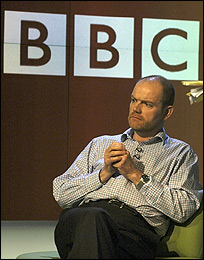Now it’s time for BBC chief Thomson to resign
19 Mar 2009 So, I have just this morning read Seven Jewish Children by Caryl Churchill, as not seen on the BBC. It won’t be seen on the BBC at all in fact because the BBC have decided that – even though they like it – it would “compromise their impartiality” to air it. Where have we heard that before?
So, I have just this morning read Seven Jewish Children by Caryl Churchill, as not seen on the BBC. It won’t be seen on the BBC at all in fact because the BBC have decided that – even though they like it – it would “compromise their impartiality” to air it. Where have we heard that before?
In my post on the BBC’s refusal to air the Gaza humanitarian appeal, I gave BBC Director-General Mark Thomson one more bat, in baseball terminology. Well, after the BBC’s decision this week not to broadcast this excellent little play, Thomson’s had, in my view, his third strike, and he’s outta there.
It took me about 5 minutes to read Seven Jewish Children. I read it in the bath. It’s not terribly upsetting, it’s not really particularly graphic either. In fact, like the Hitch Hiker’s Guide to the Galaxy’s opinion of the Earth, I would say it was “Mostly Harmless”.
The Jerusalem Post gives some useful background information that each of the series of mini monologues in the play is referring to an event in Jewish history. This relatively crucial information is not in the script, and seeing it now I can understand how it makes it more politically precise and cutting as a commentary. But overall, I must say I think this little play is fairly harmless. Its monologues consist entirely of variations on the formula “tell her” or “don’t tell her”, said by a parent thinking about what to say to a child, as in “Tell her she’ll have cake if she’s good” and “Tell her not to come out” or “Don’t tell her about the trouble with the swimming pool”.
You can read the play for yourself at www.casarotto.co.uk/page/sjc
The dialogue is very much abstract, and it’s at its most intense when the character’s internal dialogue is agonising in a bi-polar way about whether to be essentially aggressive or defensive in the face of Palestinian resistance/violence. I found this particularly convincing and personal. It is not a play that represents Jewish people as uncaring or inhuman; far from it. It makes a number of predictable and well-rehearsed Israel-critical points such as “Don’t tell her they said it was a land without people”. But no new terrible accusation is leveled at Israel or Israelis.
It is ridiculous however to say the BBC could not possibly air this; I can hear plenty of fantastical, callous, aggressive, almost fascistic statements simply by turning on Radio 2 during a phone-in hour; why can I not listen to a piece of political drama?
I have to admit I don’t even hugely love this play. But it’s nothing to get upset about, and certainly nothing that needs to be censored from the British people. If anything, for me, it is going to make me look back at those periods in history with a critical and open mind. I can’t see what’s wrong with that. In fact surely that’s a good thing. Mark Thomson’s BBC doesn’t think so, and for that reason, there needs to be a clear change of direction, coming from the leadership. He is distorting and deforming a national institution along bizarre and disturbing proto-authoritarian lines. Unless he can make a clear case that he disagrees with his own controller’s decision and is willing to set a new more liberal direction, Mark Thomson must go now.
 Email This Post
Email This Post
19 Mar 2009 Matt Wootton